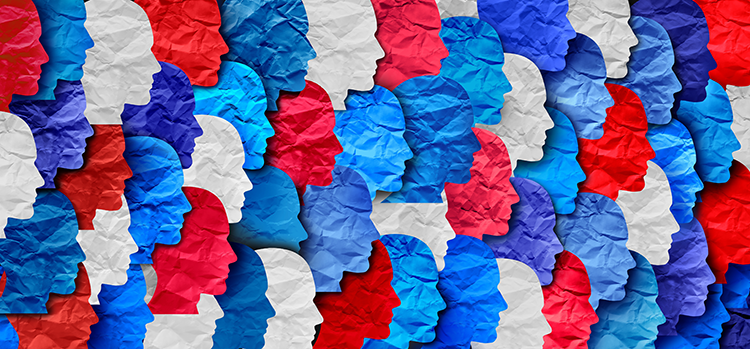Nearly three-quarters of Americans think US democracy is getting weaker, ABA poll finds

According to the sixth annual American Bar Association Survey of Civic Literacy released on Tuesday, 55% of the respondents said they had concerns about the integrity of the November 2024 general election. (Image from Shutterstock)
Seventy-four percent of U.S. residents say American democracy is weaker than five years ago, according to an ABA poll released in advance of Law Day on May 1.
Among those who thought that democracy was weaker, 31% said the primary cause was misinformation and disinformation, while 29% said the primary cause was political parties, according to the sixth annual American Bar Association Survey of Civic Literacy released on Tuesday. The survey results are from a telephone poll of 1,000 people in English and Spanish.
It wasn’t clear whether the respondents were blaming one political party over the other and what kind of misinformation that they had in mind. But it was clear that they value fair and free elections; 50% said that was the most important part of a democratic government. Another 30% said the most important part was the balance of power.
A majority of the respondents, however, had fears about election fairness. Fifty-five percent said they had concerns about the integrity of the November 2024 general election. Among those who did, 36% said their primary concern was meddling with the vote-counting process, 23% said their primary concern was voter fraud, 21% said it was voter suppression, and 10% said it was the potential for violence.
The survey also asked respondents whether they supported four different voter measures. The respondents supported voter ID requirements (80%), allowing convicted felons to vote after their release (74%), early voting (73%) and absentee voting (71%).
The poll highlights the 2024 Law Day theme “Voices of Democracy.”
As in years past, the poll also tested civics knowledge (see here, here and here).
A majority got these questions right:
• One branch of government stops another from becoming too powerful through checks and balances (72%).
• The speaker of the U.S. House of Representatives is next in line to become president if the president and vice president can no longer serve (69%).
• The U.S. Supreme Court acts as the ultimate authority in interpreting the U.S. Constitution (81%).
• John Roberts is the chief justice of the United States (58%).
• The rule of law means that everyone must follow the law (81%).
But only 44% correctly said the Constitution begins with the words “We the People,” that the Constitution and authorized federal statutes and treaties are the supreme law of the land (42%), and that the judicial branch reviews laws (41%).
The ABA presented the survey results during an online moderated panel discussion Tuesday.
One of the panelists was retired Judge J. Michael Luttig of the 4th U.S. Circuit Court of Appeals at Richmond, Virginia, an appointee of former President George H.W. Bush.
Luttig, a co-chair of the ABA Task Force for American Democracy, said he found some of the survey results troubling.
“This is the first time in American history that there has been so much confusion and so much doubt literally over democracy as a form of government and also about American elections in particular,” he said.
Luttig partly blamed claims by former President Donald Trump that the 2020 presidential election was stolen from him, despite all evidence to the contrary.
“The two political parties in America are the political guardians of democracy,” he said, and when one party isn’t functioning, democracy is put to the test.
Luttig had advised then-Vice President Mike Pence that he didn’t have the constitutional authority to reject the 2020 presidential election results. Elections are essential to American democracy, he said.
Another panelist, Danielle Allen, a public policy professor at Harvard University, said the way that political parties are currently functioning doesn’t support broad participation of the electorate.
One reform that could help, she said, was adopted in Alaska, which eliminated political primaries in favor of ranked-choice voting, according to KTOO. As result, politicians must campaign to the entire electorate, rather than political party factions, said Allen, the author of Democracy in the Time of Coronavirus.
Luttig said the framers didn’t like political parties and did not enshrine them in the Constitution.
“The founding fathers and the framers of our Constitution feared more than anything in the world a demagogue in the White House and an autocrat, and by extrapolation, demagogues in either of the political parties,” he said.
Amanda Carpenter, writer and editor at Protect Democracy, said part of the problem is that politicians are fearful because of heated rhetoric.
“If you are afraid to do your job out of fear, our institutions can no longer function,” she said.



